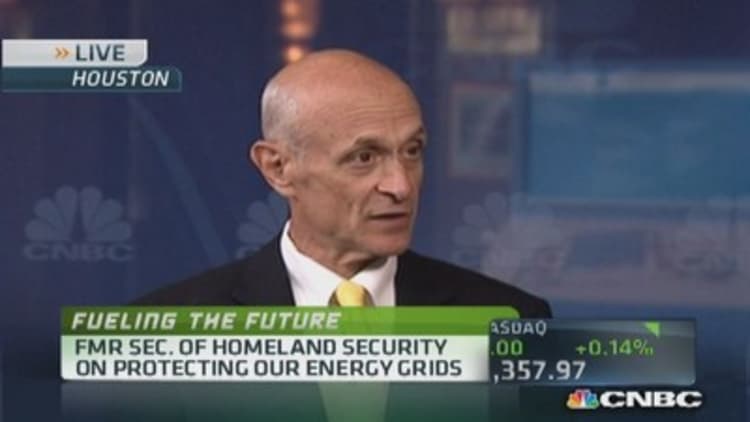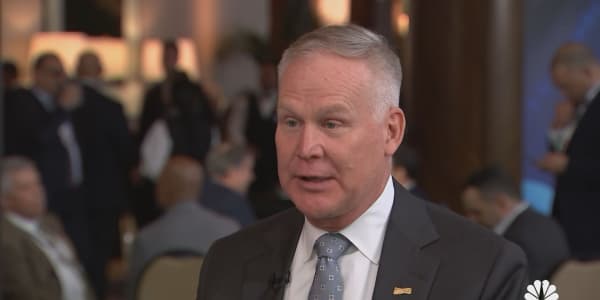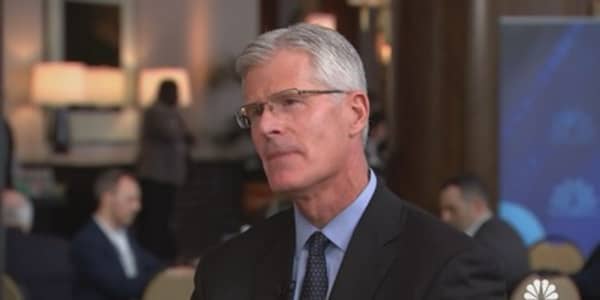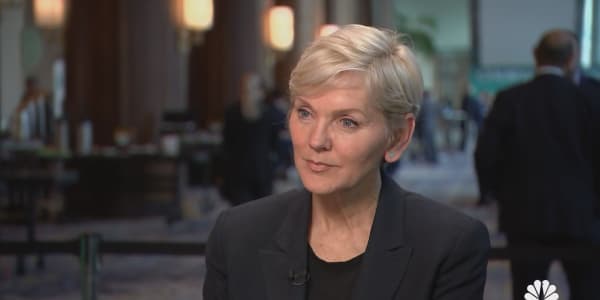Jim Rogers, the former chairman and CEO of Duke Energy, has the luxury of looking back over his long career at the helm of a regulated utility and wondering if he could have done more. Upon the recent occasion of achieving an industry lifetime achievement award, Rogers lamented in the press that he hadn't done enough about encouraging renewable energy, including solar, while running one of the biggest regulated utilities in the U.S.
When Adam Browning, executive director of solar advocacy nonprofit Vote Solar, saw Rogers' comments, he was encouraged, but wondered why his solar group was "in legal dockets fighting you [Rogers] tooth and nail five years ago."
It's much easier for a utility executive to support renewable energy when they are no longer actually running a utility. "There's something in the utility person that makes them want to own machinery," said Karl Rabago, an energy industry consultant who held former high-ranking positions at AES and Austin Energy. "It's in their bones."
There's a compelling business reason for utilities' reluctance to embrace renewable energy. Recent battles across several U.S. states over net metering—whether utilities should be compensated by rooftop solar power owners generating power on their own for use off the grid—the nastiest of which took place in Arizona, are really about something much more fundamental to the life or death of the status quo in the utility business.
Implicit in the business model of the regulated utility created in the 20th century to electrify the country is earnings based on the level of capital invested in infrastructure: the bigger the plant is that a utility builds, the bigger their "rate base."
(Read more: Like it or not, Russia-US energy interdependence here to stay)
"It's a legacy of electrifying the world," Rabago said. "We created a mechanism saying the more you invest in infrastructure to electrify the more profits you will make ... higher rate base equals higher return. ... The joke used to be it's the only business where you could get a rate increase for redecorating the CEO's office."
Power to the people
The "own and control" mentality and earnings model of regulated utilities is being threatened in an unprecedented way. And it's not just about solar on the rooftop. The battles that have recently played out in states including Arizona, Georgia and Colorado over net metering have focused on solar, but the experts say that misses the point.
As distributed generation technologies become cheaper and more widely adopted, regulated utilities need to find a way to adapt to customers being owners, or, according to some critics, go into a death spiral. Solar, residential natural gas turbines and energy storage units are among the technologies giving new meaning to the term "power to the people."
"Utilities tend not to lead," said Richard Sedano, director at the Regulatory Assistance Project, an energy think tank. "What they do tend to do is do safe things. The role of a monopolist as competitor, there's something strange about that."
When Dominion Virginia Power recently released its latest Integrated Resource Plan (IRP) it included a statement that underlies the standard thinking in the regulated utility model: The company said it did not include consideration of "behind the meter" generation in its IRP because it did not own or control the distributed generation.
(Read more: Tapping 100 years of US energy at light speed)
Eran Mahrer, vice president of utility strategy at the Solar Electric Power Association, an industry association providing education to utilities whose majority membership is utility companies, said, "I think that what Dominion Virginia said is entirely fair. Their statement is shared by good majority of the industry. We look at distributed generation solar as a net load reduction, not resource contribution, and the short answer is as long as they have zero transparency into the operation of the resource, since you have no control over it, you do look at it as a net reduction."
Other energy experts highlighted that IRP as the symbol of the threat to the future of utilities in their inability to adapt to innovations in distributed generation. "There's a fundamental mental obstacle," Rabago said.
Dominion Virginia Power did not respond to a request for comment.
In a recent energy trade publication's annual survey of utility executives, 57 percent said they view distributed generation as an opportunity. Browning said of that 57 percent, he guarantees that not one utility actually has a business plan for their regulated service territory reflecting the statement.
Florida Power & Light is a regulated utility that is associated with more action than most in actively deploying solar—its affiliated with NextEra Energy. Last year, NextEra hired Andrew Beebe, formerly of Chinese solar company Suntech, as vice president of distributed generation, yet even FPL is reluctant to discuss the emerging issue. Beebe declined to comment on the company's plans through a Florida Power & Light spokesman, who said it was a subject they are not comfortable commenting on.
A spokeswoman at the Brookings Institution, where Rogers is now vice chairman, did not respond to repeated requests for comment.
If there is one utility company that has been most vocal in support of solar, it is NRG Energy and its CEO David Crane—who recently referred to his own industry as "shockingly stupid". There's a simple, business reason why Crane can afford to be so vocal—NRG is a retail and merchant energy provider, not a regulated utility.
"If you think about a utility as something that has wires on the ground and service meters, we aren't a utility," said Steve Corneli, NRG's senior vice president of sustainability. "They have to get all that money back in rates. ... The problem utilities run into with distributed generation and energy efficiency and demand response and new energy services, all that stuff, is that all those things reduce the number of kilowatt hours consumers are buying. ... All that kind of capital intensive investment to keep the lights on has costs that go up even more with less sales," Corneli said.
(Read more: Google's huge investment in clean energy)
NRG sees things only getting worse for regulated utilities: capital intensive costs on top of less sales means passing on higher rates to consumers and that will only push more consumers to look for alternatives like rooftop solar.
"That's called competition, and that's why a new utility model is needed," Corneli said. Energy experts said NRG's support of solar is somewhat self-serving—it has nothing to lose in taking advantage of the weakness of the regulated utility. Energy experts agreed that this is an existential threat to the regulated utility model that dominated the 20th century.
The green tea party
For proof, one can look to the state of Georgia, where the Public Service Commission recently pushed the regulated utility to issue a mandate for roughly 500 megawatts of solar power. Out in the streets protesting a utility plan being considered by the Public Service Commission weren't greenies wearing Birkenstocks and bused in from San Francisco, but tea party and libertarian-minded consumers—the green tea party.
"The tea party came out in full support of solar," said Jigar Shah, founder of solar company SunEdison and board member of the Carbon War Room. "Two of the most conservative talk show hosts in Georgia said 'stop pissing on solar.' "
For Shah, the battle isn't between solar and utilities, it's between utilities and their increasingly empowered customers, and that isn't going to change.
"That old one-way relationship between a utility and customer is changing and it's not just a solar issue," Browning said. "In Georgia, we had enraged libertarians and they legitimately led a revolution to say no. ... Supermajorities want to see a transition to renewable and utilities are not delivering. They have fought every step of the way. It's a problem of their own making, so they either figure out how to transition or get out of the way."
(Read more: Financing the solar panel on your neighbor's roof)

Lauren "Bubba" McDonald, commissioner of the Georgia Public Service Commission, describes himself as a very conservative regulator with a track record of being conservative over the years.
"I went to the power structure and suggested they needed some solar in the IRP. We are not here to just adopt anything the power company sends to us. The way I presented it to the utility was that we can take this on our own or we can be partners and we can make it work, and if we do it in an adversarial way, we both lose," McDonald said. "Utilities who say they don't include 'beyond the meter', sorry about that. You don't have the monopoly right to generate," McDonald said. "I answer to 8 million people in Georgia," he added.
Turning the lights out
SEPA's Mahrer said that "Bubba he is an odd bird example of when the renewable industry ends up finding itself pretty aligned with the tea party," but it speaks to the real issue: distributed generation solar is the first opportunity to passively deregulate the electric utility industry.
"Utilities have defended themselves from third-party rooftop by suggesting it infringes on franchise regulatory territory and it's been upheld in states. Legally and technically it's correct but I don't think utilities have had to defend against individual customers in past," Mahrer said. "It's an interesting conversation about what entity ultimately succeeds when the debate is directly against customers. We will see more industry transition. We will have utilities recognize distributed generation as contributing resource."
"Bubba McDonald may be the best friend the utility industry has ever seen because he is proposing a path forward using a utility model," Rabago said.
Shah said the issue is much more political, and much less heroic than McDonald being a champion for solar. "The question becomes, are public service commissions going to ban people's ability to have an alternative to higher-priced power and the answer is absolutely not."
Rogers, in his recent comments, placed much of the blame on the regulatory structure, though several energy experts contend there is nothing that would stop a utility from proposing any innovative idea it thinks should be considered.
The utility model invented in 1913—101 years ago—was tremendously effective at bringing big boilers to America but it has had no competition for a century. NRG's Corneli said it may not automatically be a death spiral, but "101 years of that has made it difficult for people to innovate and put capital at risk. That's not the way innovation works."
Experts note that even NRG has placed a much greater focus to date on large-scale solar plant construction over distributed generation that is under control of individual businesses and consumers.
Whether it is Duke or NRG, utilities are putting out mandates for hundreds of megawatts of large-scale solar (the Georgia example is also heavily tilted to large-scale solar plants), but "megawatts don't equal a market," Rabago said.
To this point, the comprise from the utility has been to put more solar on the system and ask the consumer, "OK, are you happy now?" Browning said. "It's a welcome development but unlikely to stop clamoring for more choice. I don't know a single investor-owned utility that has a business plan compatible with a livable planet."
Rabago sees an industry that has not taken the necessary steps, but isn't so stubborn as to want to be on the wrong side of history.
In any regulated utility boardroom, Rabago said it is easy to imagine the conversation about the state of the business in a flat to declining U.S. energy demand environment: The chairman of the company asks what can be done about flat earnings and the CEO says it's the state of the economy, and the weather and commodity fuel prices that make up 98 percent of the utility's financial outlook and it has no control over that 98 percent.
However, the other 2 percent of headwinds are things like energy efficiency and solar. "The utility board has been given two big choices: fundamentally transition the business or go on a full-blown attack against a tiny little thing like solar," Rabago said. He added that while solar is the most charismatic of distributed generation sources, behind it are storage, electric vehicles, savings from demand response, micro-grid security and intelligent management of a smarter grid. Electric vehicles stand out as a technology innovation that could actually benefit utilities. "Accelerated EV adoption could more than make up for the loss from distributed generation," Rabago said.
Utility regulation is filled with sticks and not many carrots, and no model has been proposed by companies or regulators that would financially reward a regulated utility for considering distributed generation as an opportunity—though there is no reason one could not be proposed along these lines.
If utilities have been hush, if not outright antagonistic on the topic to date, they are likely thinking about it. "Utilities aren't sleeping," Sedano said. "Technology will make consumers more powerful and that will change the utility system a lot. But what some innovators are trying to accomplish is threatening," Sedano said.
Shah has a dimmer view of the transition that Rabago and Sedano hope will be embraced by utilities. "There are 300 public utilities in this country and six might be successful on the other side. By 2020, this whole market will be firmly disrupted."
Shah said pension funds have started divesting shares of utilities saying they are no longer reliable because they are losing growth and now with solar energy on rooftops and other distributed generation and energy efficiency, the only way to protect themselves is by investing in opportunities their mindset and business model is not designed to accommodate.
"Hedge funds managers are calling me on whether they should be shorting utilities and that will be an actual strategy deployed by hedge funds in coming years, and when we are having that conversation that means the end is near."
—By Eric Rosenbaum, CNBC.com.





